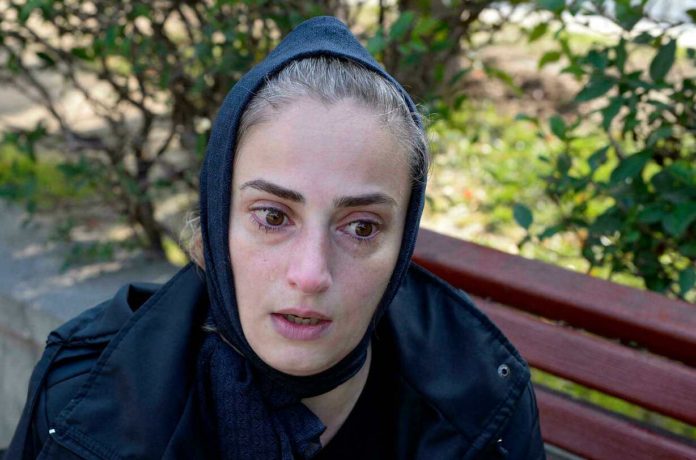BAKU: Dilara Bagiyeva’s face grew pale as she recounted how, after suffering abuse from her husband for a decade, he turned on their eight-year-old daughter in a drunken fit last year.
That evening in November, he returned home intoxicated to their 13th-floor apartment in Azerbaijan’s capital Baku, beating Bagiyeva first in the bedroom, then the hallway and finally the kitchen, where he tried to throw her from the balcony.
Before the 41-year-old English teacher lost consciousness, she remembered her daughter Farah pleading: “Daddy, don’t hit my mom.”
When she came to, Farah was nowhere to be seen. Police who arrived at the scene shortly after refused to let Bagiyeva see the body.
“He dragged me out onto the balcony that night to throw me off. Instead, he threw my baby out the window,” Bagiyeva said.
“She was my everything,” she added, looking at a picture of her daughter on her phone.
Bagiyeva is among thousands of women subjected to domestic violence in Azerbaijan, where activists are sounding the alarm over femicide despite considerable barriers in the conservative Caspian Sea country.
Seventy-one women were killed in the ex-Soviet republic by husbands or male relatives last year and 48 more in the first eight months of 2021, the office of Azerbaijan’s prosecutor general told AFP in an email.
The first Muslim nation to introduce universal suffrage in 1919, Azerbaijan is one of the most secular countries in the Islamic world.
But wives and daughters are often limited to carrying out family duties in its male-dominated society, which tolerates abuse against women.
‘Fear of retribution’
Officials said the approximately 2,000 cases of domestic violence against women that are reported annually are just the tip of the iceberg, as most victims remain silent.
“Many women don’t phone the police for fear of retribution from family members,” said Taliya Ibrahimova of the state committee for women’s affairs.
The government last year adopted a four-year action plan to combat domestic violence that included setting up a hotline and a state-run shelter for victims.
Ibrahimova said a 2010 law to tackle domestic violence was being updated, and the violation would soon become a separate category of offence in the penal code.
But activists say the measures are not enough, and accuse the authoritarian government of President Ilham Aliyev of failing to protect women.
“Femicide is a political issue because tackling the problem requires political will,” said Gulnara Mehdiyeva, a prominent women’s rights activist.
She described Azerbaijan’s political system as “despotic”, and said the authorities “don’t want citizens to know their rights”.
Mehdiyeva said activists had come under pressure from conservative groups since March 8 last year, when they held their first rally to raise awareness of violence against women.
She said a pro-government website had even leaked recordings of her conversations with a friend “to portray me as a whore and to shame me”.
There is a prevalent “negative attitude in society that accuses us of eroding family values”, Mehdiyeva said.
The US embassy this year raised concerns over the killings of women, while the British embassy urged Azerbaijan to join the 2011 Istanbul Convention on combating violence against women and domestic violence.
Azerbaijan is among just a handful of countries that have not ratified the first legally binding international treaty to address the issue.
‘Until my last breath’
The United Nations says Azerbaijan lacks the statistics to accurately track trends on women’s rights, including on the pay gap and physical and sexual harassment.
But it noted that, as of February this year, women held only 18 percent of seats in parliament.
“Women lack the foundational representation in public office that would ensure that others hear their voices,” the Borgen Project, a US-based women’s rights group said last year.
Lawyer Zibeyda Sadikova said police “don’t take seriously” women who report domestic abuse, but instead “shame and subject them to psychological pressure”.
“Many women I try to convince to report (abuse) to the police say they already did, and the police told them to reconcile with their husbands, who have since continued beating them,” she said.
“Most people in society think a woman must be locked up at home and her husband has the right to beat her.”
She said the flawed implementation of government policies and gaps in legislation added to the problem.
“The government must fill such legal gaps, initiate an awareness-raising campaign, and ensure women’s access to psychological and judicial assistance,” she said.
Bagiyeva said her husband was at first only charged for beating her and not for murdering her child, whose death was ruled a suicide.
But she said a murder probe was now underway, and she had appealed to the prosecutor general and even to strongman Aliyev for justice.
“I will fight until my last breath, until my strength expires, to restore justice, so the truth comes out,” she said.
